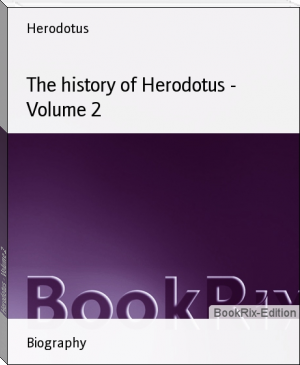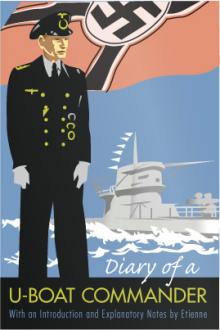The history of Herodotus - Volume 2 - Herodotus (manga ereader txt) 📗

- Author: Herodotus
Book online «The history of Herodotus - Volume 2 - Herodotus (manga ereader txt) 📗». Author Herodotus
celebrating the Hyakinthia; and they held it of the greatest consequence to provide for the things which concerned the god, while at the same time their wall which they had been building at the Isthmus was just at this moment being completed with battlements. And when the envoys from the Athenians came to Lacedemon, bringing with them also envoys from Megara and Plataia, they came in before the Ephors and said as follows: "The Athenians sent us saying that the king of the Medes not only offers to give us back our land, but also desires to make us his allies on fair and equal terms without deceit or treachery,[7] and is desirous moreover to give us another land in addition to our own, whichsoever we shall ourselves choose. We however, having respect for Zeus of the Hellenes and disdaining to be traitors to Hellas, did not agree but refused, although we were unjustly dealt with by the other Hellenes and left to destruction, and although we knew that it was more profitable to make a treaty with the Persian than to carry on war: nor shall we make a treaty at any future time, if we have our own will. Thus sincerely is our duty done towards the Hellenes:[8] but as for you, after having come then to great dread lest we should make a treaty with the Persian, so soon as ye learnt certainly what our spirit was, namely that we should never betray Hellas, and because your wall across the Isthmus is all but finished, now ye make no account of the Athenians, but having agreed with us to come to Bœotia to oppose the Persian, ye have now deserted us, and ye permitted the Barbarian moreover to make invasion of Attica. For the present then the Athenians have anger against you, for ye did not do as was fitting to be done: and now they bid[9] you with all speed send out an army together with us, in order that we may receive the Barbarian in the land of Attica; for since we failed of Bœotia, the most suitable place to fight in our land is the Thriasian plain." 8. When the Ephors heard this they deferred their reply to the next day, and then on the next day to the succeeding one; and this they did even for ten days, deferring the matter from day to day, while during this time the whole body of the Peloponnesians were building the wall over the Isthmus with great diligence and were just about to complete it. Now I am not able to say why, when Alexander the Macedonian had come to Athens, they were so very anxious lest the Athenians should take the side of the Medes, whereas now they had no care about it, except indeed that their wall over the Isthmus had now been built, and they thought they had no need of the Athenians any more; whereas when Alexander came to Attica the wall had not yet been completed, but they were working at it in great dread of the Persians. 9. At last however the answer was given and the going forth of the Spartans took place in the following manner:-on the day before that which was appointed for the last hearing of the envoys, Chileos a man of Tegea, who of all strangers had most influence in Lacedemon, heard from the Ephors all that which the Athenians were saying; and he, it seems, said to them these words: "Thus the matter stands, Ephors:-if the Athenians are not friendly with us but are allies of the Barbarian, then though a strong wall may have been built across the Isthmus, yet a wide door has been opened for the Persian into Peloponnesus. Listen to their request, however, before the Athenians resolve upon something else tending to the fall of Hellas." 10. Thus he counselled them, and they forthwith took his words to heart; and saying nothing to the envoys who had come from the cities, while yet it was night they sent out five thousand Spartans, with no less than seven of the Helots set to attend upon each man of them,[9a] appointing Pausanias the son of Cleombrotos to lead them forth. Now the leadership belonged to Pleistarchos the son of Leonidas; but he was yet a boy, and the other was his guardian and cousin: for Cleombrotos, the father of Pausanias and son of Anaxandrides, was no longer alive, but when he had led home from the Isthmus the army which had built the wall, no long time after this he died. Now the reason why Cleombrotos led home the army from the Isthmus was this:-as he was offering sacrifice for fighting against the Persian, the sun was darkened in the heaven. And Pausanias chose as commander in addition to himself Euryanax the son of Dorieos, a man of the same house. 11. So Pausanias with his army had gone forth out of Sparta; and the envoys, when day had come, not knowing anything of this going forth, came in before the Ephors meaning to depart also, each to his own State: and when they had come in before them they said these words: "Ye, O Lacedemonians, are remaining here and celebrating this Hyakinthia and disporting yourselves, having left your allies to destruction; and the Athenians being wronged by you and for want of allies will make peace with the Persians on such terms as they can: and having made peace, evidently we become allies of the king, and therefore we shall join with him in expeditions against any land to which the Persians may lead us; and ye will learn then what shall be the issue for you of this matter." When the envoys spoke these words, the Ephors said and confirmed it with an oath, that they supposed by this time the men were at Orestheion on their way against the strangers: for they used to call the Barbarians "strangers."[10] So they, not knowing of the matter, asked the meaning of these words, and asking they learnt all the truth; so that they were struck with amazement and set forth as quickly as possible in pursuit; and together with them five thousand chosen hoplites of the Lacedemonian "dwellers in the country round"[11] did the same thing also.
12. They then, I say, were hastening towards the Isthmus; and the Argives so soon as they heard that Pausanias with his army had gone forth from Sparta, sent as a herald to Attica the best whom they could find of the long-distance runners,[12] because they had before of their own motion engaged for Mardonios that they would stop the Spartans from going forth: and the herald when he came to Athens spoke as follows: "Mardonios, the Argives sent me to tell thee that the young men have gone forth from Lacedemon, and that the Argives are not able to stop them from going forth: with regard to this therefore may it be thy fortune to take measures well."[13] 13. He having spoken thus departed and went back; and Mardonios was by no means anxious any more to remain in Attica when he heard this message. Before he was informed of this he had been waiting, because he desired to know the news from the Athenians as to what they were about to do; and he had not been injuring or laying waste the land of Attica, because he hoped always that they would make a treaty with him; but as he did not persuade them, being now informed of everything he began to retire out of the country before the force of Pausanias arrived at the Isthmus, having first set fire to Athens and cast down and destroyed whatever was left standing of the walls, houses or temples. Now he marched away for this cause, namely first because Attica was not a land where horsemen could act freely, and also because, if he should be defeated in a battle in Attica, there was no way of retreat except by a narrow pass, so that a few men could stop them. He intended therefore to retreat to Thebes, and engage battle near to a friendly city and to a country where horsemen could act freely.
14. Mardonios then was retiring out of the way, and when he was already upon a road a message came to him saying that another body of troops in advance of the rest[14] had come to Megara, consisting of a thousand Lacedemonians. Being thus informed he took counsel with himself, desiring if possible first to capture these. Therefore he turned back and proceeded to lead his army towards Megara, and the cavalry going in advance of the rest overran the Megaran land: this was the furthest land in Europe towards the sun-setting to which this Persian army came. 15. After this a message came to Mardonios that the Hellenes were assembled at the Isthmus; therefore he marched back by Dekeleia, for the chiefs of Bœotia[15] had sent for those of the Asopians who dwelt near the line of march, and these were his guides along the road to Sphendaleis and thence to Tanagra. So having encamped for the night at Tanagra and on the next day having directed his march to Scolos, he was within the land of the Thebans. Then he proceeded to cut down the trees in the lands of the Thebans, although they were on the side of the Medes, moved not at all by enmity to them, but pressed by urgent necessity both to make a defence for his camp, and also he was making it for a refuge, in case that when he engaged battle things should not turn out for him as he desired. Now the encampment of his army extended from Erythrai along by Hysiai and reached the river Asopos: he was not however making the wall to extend so far as this, but with each face measuring somewhere about ten furlongs.[16]
16. While the Barbarians were engaged upon this work, Attaginos the son of Phyrnon, a Theban, having made magnificent preparations invited to an entertainment Mardonios himself and fifty of the Persians who were of most account; and these being invited came; and the dinner was given at Thebes. Now this which follows I heard from Thersander, an Orchomenian and a man of very high repute in Orchomenos. This Thersander said that he too was invited by Attaginos to this dinner, and there were invited also fifty men of the Thebans, and their host did not place them to recline[17] separately each nation by themselves, but a Persian and a Theban upon every couch. Then when dinner was over, as they were drinking pledges to one another,[18] the Persian who shared a couch with him speaking in the Hellenic tongue asked him of what place he was, and he answered that he was of Orchomenos. The other said: "Since now thou hast become my table- companion and the sharer of my libation, I desire to leave behind with thee a memorial of my opinion, in order that thou thyself also mayest know beforehand and be able to take such counsels for thyself as may be profitable. Dost thou see these Persians who are feasting here, and the army which we left behind encamped upon the river? Of all these, when a little time has gone by, thou shalt see but very few surviving." While the Persian said these words he shed many tears, as Thersander reported; and he marvelling at his speech said to him: "Surely then it is right to tell Mardonios and to those of the Persians who after him are held in regard." He upon this said: "Friend, that which is destined to come from God, it is impossible for a man to avert; for no man is willing to follow counsel, even when one speaks that which is reasonable. And these things which I
12. They then, I say, were hastening towards the Isthmus; and the Argives so soon as they heard that Pausanias with his army had gone forth from Sparta, sent as a herald to Attica the best whom they could find of the long-distance runners,[12] because they had before of their own motion engaged for Mardonios that they would stop the Spartans from going forth: and the herald when he came to Athens spoke as follows: "Mardonios, the Argives sent me to tell thee that the young men have gone forth from Lacedemon, and that the Argives are not able to stop them from going forth: with regard to this therefore may it be thy fortune to take measures well."[13] 13. He having spoken thus departed and went back; and Mardonios was by no means anxious any more to remain in Attica when he heard this message. Before he was informed of this he had been waiting, because he desired to know the news from the Athenians as to what they were about to do; and he had not been injuring or laying waste the land of Attica, because he hoped always that they would make a treaty with him; but as he did not persuade them, being now informed of everything he began to retire out of the country before the force of Pausanias arrived at the Isthmus, having first set fire to Athens and cast down and destroyed whatever was left standing of the walls, houses or temples. Now he marched away for this cause, namely first because Attica was not a land where horsemen could act freely, and also because, if he should be defeated in a battle in Attica, there was no way of retreat except by a narrow pass, so that a few men could stop them. He intended therefore to retreat to Thebes, and engage battle near to a friendly city and to a country where horsemen could act freely.
14. Mardonios then was retiring out of the way, and when he was already upon a road a message came to him saying that another body of troops in advance of the rest[14] had come to Megara, consisting of a thousand Lacedemonians. Being thus informed he took counsel with himself, desiring if possible first to capture these. Therefore he turned back and proceeded to lead his army towards Megara, and the cavalry going in advance of the rest overran the Megaran land: this was the furthest land in Europe towards the sun-setting to which this Persian army came. 15. After this a message came to Mardonios that the Hellenes were assembled at the Isthmus; therefore he marched back by Dekeleia, for the chiefs of Bœotia[15] had sent for those of the Asopians who dwelt near the line of march, and these were his guides along the road to Sphendaleis and thence to Tanagra. So having encamped for the night at Tanagra and on the next day having directed his march to Scolos, he was within the land of the Thebans. Then he proceeded to cut down the trees in the lands of the Thebans, although they were on the side of the Medes, moved not at all by enmity to them, but pressed by urgent necessity both to make a defence for his camp, and also he was making it for a refuge, in case that when he engaged battle things should not turn out for him as he desired. Now the encampment of his army extended from Erythrai along by Hysiai and reached the river Asopos: he was not however making the wall to extend so far as this, but with each face measuring somewhere about ten furlongs.[16]
16. While the Barbarians were engaged upon this work, Attaginos the son of Phyrnon, a Theban, having made magnificent preparations invited to an entertainment Mardonios himself and fifty of the Persians who were of most account; and these being invited came; and the dinner was given at Thebes. Now this which follows I heard from Thersander, an Orchomenian and a man of very high repute in Orchomenos. This Thersander said that he too was invited by Attaginos to this dinner, and there were invited also fifty men of the Thebans, and their host did not place them to recline[17] separately each nation by themselves, but a Persian and a Theban upon every couch. Then when dinner was over, as they were drinking pledges to one another,[18] the Persian who shared a couch with him speaking in the Hellenic tongue asked him of what place he was, and he answered that he was of Orchomenos. The other said: "Since now thou hast become my table- companion and the sharer of my libation, I desire to leave behind with thee a memorial of my opinion, in order that thou thyself also mayest know beforehand and be able to take such counsels for thyself as may be profitable. Dost thou see these Persians who are feasting here, and the army which we left behind encamped upon the river? Of all these, when a little time has gone by, thou shalt see but very few surviving." While the Persian said these words he shed many tears, as Thersander reported; and he marvelling at his speech said to him: "Surely then it is right to tell Mardonios and to those of the Persians who after him are held in regard." He upon this said: "Friend, that which is destined to come from God, it is impossible for a man to avert; for no man is willing to follow counsel, even when one speaks that which is reasonable. And these things which I
Free e-book «The history of Herodotus - Volume 2 - Herodotus (manga ereader txt) 📗» - read online now
Similar e-books:





Comments (0)